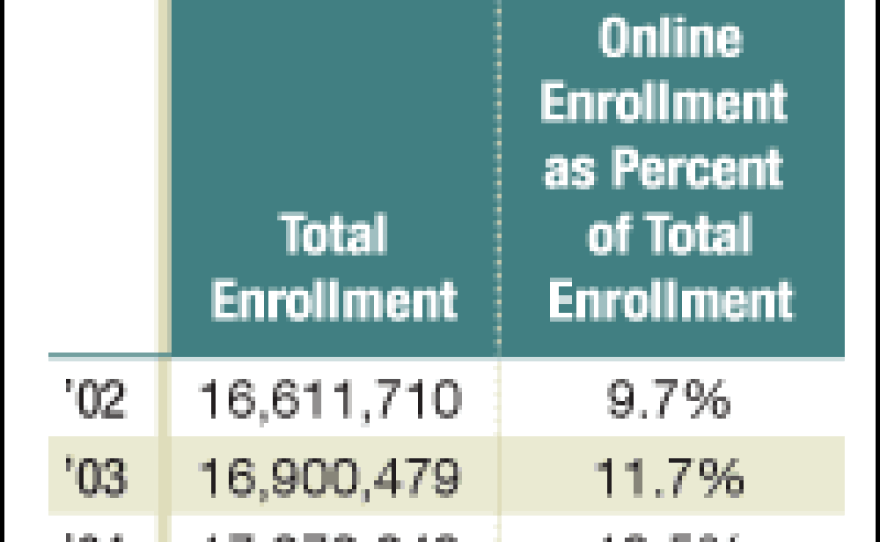
To see the future of higher education, look no further than your computer screen. Online education is growing at many times the rate of higher education overall, according to a new survey.
In the past, some prestigious schools have looked down on distance learning, fearing the quality could never measure up. But now some colleges require that students take at least one course online.
The University of Illinois campus in Springfield is small, about 5,000 students. Compared with the campuses in Chicago and Urbana-Champaign, Springfield is a tiny outpost on the prairie. But when it comes to online education, this school is a titan.
Tech Fair
On a recent day, Michelle Gribbens of the school's Management Information Systems department addresses about 40 faculty members. These are not the adjunct faculty that staff many online programs. Nearly all are regular professors, with a lot of experience teaching online. They're here to get better at what they do.
Gribbens' class is part pedagogy seminar and part tech fair. Professor Burke Oakley explains how he can adapt if the school's site goes down.
"I can set up a wiki at pbwiki [www.pbwiki.com]. We can go there or at wikispaces.org, and my students can continue to work," Oakley said.
Some of the faculty roll their eyes, and despair at the challenge of mastering all these new tools. Many say it's all they can do to post the text of their lectures.
Being Effective Online
Ted Mims, head of the computer science department, said that with or without gadgets, he and his colleagues have to find ways to be effective online.
"But I can assure you that the next generation of students are '24/7 students' that want stuff right now. They don't want to come to your class and listen to a professor lecture and tell funny stories," Mims said. "They want just what they need to succeed in that class and get a job and be successful in life."
These seminars are one way this campus is trying to boost the quality of online teaching. The school is also applying the same standards to online and off-line courses, according to Springfield provost Harry Berman.
"It's the same faculty that are teaching our 'on ground' courses and our online courses. And these are faculty who are evaluated in the ways that we evaluate faculty in general," Berman said. "We don't differentiate between the evaluation of their online courses and their on campus courses."
Springfield faculty members are proud of their reputation for online education. Some are a little put off that the University of Illinois at Urbana-Champaign, their big brother school — a short drive up Interstate 72 — has decided to jump into online learning with both feet.
Global Campus
Joseph White, president of the University of Illinois system, said the Urbana-Champaign campus held back on a big investment in online education, concerned that the technology and his faculty were not ready. But on Jan. 1, the university's "global campus" will light up.
Without adding any new buildings, the university eventually hopes to reach more than 10,000 new online students over the next few years.
White predicts that plenty of students will still come to campus to study and watch the Fighting Illini play ball.
"But let's be honest, there are hundreds of thousands of people in the world who don't have the privilege of earning their education by leaving home, giving up their job, leaving the family and living on one of these campuses," White said.
The global campus is "located," as it were, in a low-slung office park that looks more like a doctor's office than a college building. Here, designers are working on getting the "campus" ready for opening day.
Designer Michael Lindeman displays his avatar, an online personality, in a feature in the online campus that the university may use to give it a little heart. It's a meeting place for the university's students in the virtual world known as "Second Life."
"There is a coffee house, you can see through the window, where you can get an espresso and sit around with your colleagues," Lindeman said.
OK, it's not Berkeley's Cafe Med, where some of us wasted time in college. But it's getting there.
If any of this seems strange, get over it. Because the next wave in e-learning about to crash on our shores is m-learning, as in mobile learning, delivered to your cell phone.
Copyright 2022 NPR. To see more, visit https://www.npr.org. 9(MDAzMjM2NDYzMDEyMzc1Njk5NjAxNzY3OQ001))






